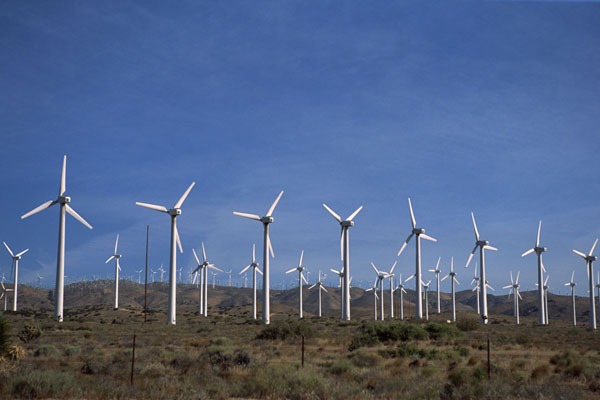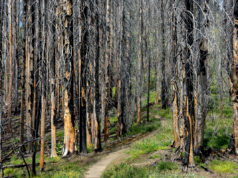Dear EarthTalk: What is the “Production Tax Credit” and why is it so important to developing alternative renewable energy? – Sean Gallagher,
“Available on and off since 1992, the federal Production Tax Credit (PTC) has bolstered the success of many alternative energy providers. The subsidy has been extended again, but only for a year, a “here today/gone tomorrow” situation that has made it tough for companies to forge ahead with confidence”
Environmentalists and wind energy boosters breathed a sigh of relief this past January when Congress voted to reinstate the Production Tax Credit (PTC), a federal tax incentive for companies that generate renewable energy from wind, geothermal or “closed-loop” biomass (dedicated energy crops) sources.
The credit, worth 2.2 cents per kilowatt-hour of energy produced, remains in effect for the first 10 years of a qualifying renewable energy facility’s operation. Other technologies such as “open-loop” biomass (using farm and forest wastes rather than dedicated energy crops), efficiency upgrades and capacity additions for existing hydro-electric, small irrigation, landfill gas and municipal solid waste systems qualify under the program for a lesser credit of 1.1 cents per kilowatt-hour produced. The PTC, which had expired at the end of 2012, can in effect get wind and other qualifying renewable energy technologies down into the price range of conventional energy sources.
Available off and on again in one form or another since 1992, the PTC has been key to helping many small utility-grade alternative energy providers get their businesses off the ground, which in turn has created hundreds of thousands of green jobs. According to the American Wind Energy Association (AWEA), the PTC has helped the
But Congress has let the PTC expire without renewal four times previously, leaving high and dry the alternative energy producers who depend upon it to make ends meet. Some argue that the “here today, gone tomorrow” nature of the PTC has actually hurt small providers who have not been able to count on what amounts to a subsidy for helping push the country in the right direction energy-wise: “This ‘on-again/off-again’ status contributes to a boom-bust cycle of development that plagues the wind industry,” reports the Union of Concerned Scientists (UCS), a non-profit which puts independent science to work to solve the planet’s most pressing problems. “In the years following expiration, installations dropped between 73 and 93 percent, with corresponding job losses.”
This time around Congress has once again only extended the PTC for one more year, leaving the future uncertain still for qualifying producers and reducing the security of any investments in U.S.-based wind, geothermal and biomass projects. “Short-term extensions of the PTC are insufficient for sustaining the long-term growth of renewable energy,” reports UCS, adding that the planning and permitting process for new wind facilities can take two years or more to complete. “As a result, many renewable energy developers that depend on the PTC to improve a facility’s cost effectiveness may hesitate to start a new project due to the uncertainty that the credit will still be available to them when the project is completed.”
The shame of it is that wind energy is one of
CONTACTS: AWEA, www.awea.org ; UCS, www.ucsusa.org
Pic courtesy: Comstock
EarthTalk® is written and edited by Roddy Scheer and Doug Moss and is a registered trademark of E – The Environmental Magazine (www.emagazine.com). Send questions to: earthtalk@emagazine.com. Subscribe:http://www.emagazine.com/subscribe Free Trial Issue: www.emagazine.com/trial








